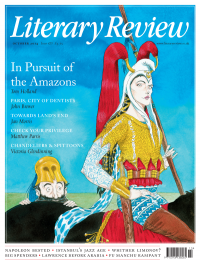Joanna Kavenna
Balm for Gilead
Lila
By Marilynne Robinson
Virago 261pp £16.99
Theories of reality abound. Many are dismissed, while others become dominant and even, for a time, unquestionable. Cartesian dualism, 19th-century materialist science, hyper-subjective modernism, Einsteinian relativity, the Borgesian realms of quantum physics: these are defined as ‘secular’ realities, though all require a leap of faith. Then there are the ‘religious’ realities of prevailing creeds. The novelist, essayist and theologian Marilynne Robinson defines the dominant reality of our age as ‘materialism’ – the notion that the ‘physical world that is manifest describes reality exhaustively’. In essays and non-fiction works such as Absence of Mind (2010), Robinson praises the dynamic uncertainties of contemporary physics, while berating Richard Dawkins, Daniel Dennett et al for their belief that ‘science has revealed the world as a closed system’. Meanwhile, Robinson continues, ‘the mind, as felt experience, has been excluded from important fields of modern thought’. Like Whitman – or Nietzsche, or so many theologians, or so many modernists – Robinson emphasises subjective, ‘felt’ experience or ‘inwardness’.
Anti-materialism can of course be nondenominational; Virginia Woolf, for example, defined ‘spiritualism’ as the desire to reveal ‘the flickerings of that innermost flame’. Yet Robinson cites her anti-materialism in relation to Christianity; she is a self-professed Congregationalist and occasional preacher, and many of her fictional characters are preachers and Congregationalists

Sign Up to our newsletter
Receive free articles, highlights from the archive, news, details of prizes, and much more.@Lit_Review
Follow Literary Review on Twitter
Twitter Feed
Under its longest-serving editor, Graydon Carter, Vanity Fair was that rare thing – a New York society magazine that published serious journalism.
@PeterPeteryork looks at what Carter got right.
Peter York - Deluxe Editions
Peter York: Deluxe Editions - When the Going Was Good: An Editor’s Adventures During the Last Golden Age of Magazines by Graydon Carter
literaryreview.co.uk
Henry James returned to America in 1904 with three objectives: to see his brother William, to deliver a series of lectures on Balzac, and to gather material for a pair of books about modern America.
Peter Rose follows James out west.
Peter Rose - The Restless Analyst
Peter Rose: The Restless Analyst - Henry James Comes Home: Rediscovering America in the Gilded Age by Peter Brooks...
literaryreview.co.uk
Vladimir Putin served his apprenticeship in the KGB toward the end of the Cold War, a period during which Western societies were infiltrated by so-called 'illegals'.
Piers Brendon examines how the culture of Soviet spycraft shaped his thinking.
Piers Brendon - Tinker, Tailor, Sleeper, Troll
Piers Brendon: Tinker, Tailor, Sleeper, Troll - The Illegals: Russia’s Most Audacious Spies and the Plot to Infiltrate the West by Shaun Walker
literaryreview.co.uk